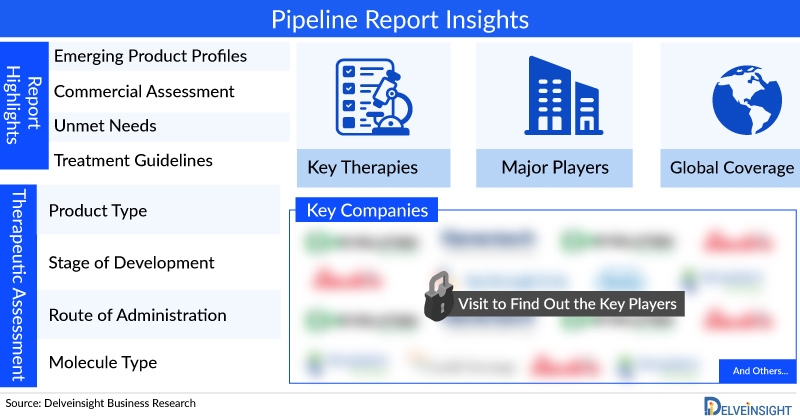DelveInsight’s “Minimal Change Disease – Pipeline Insight, 2025” outlines the evolving therapeutic landscape, highlighting over 10 emerging candidates across various stages of clinical development aiming to improve remission rates and reduce long-term renal damage.
The pathophysiology of MCD is increasingly linked to podocyte dysfunction, T-cell dysregulation, and permeability factors, prompting a shift toward targeted immunomodulation. Several agents under development are designed to address these mechanisms. Therapies such as rituximab have shown promise in reducing relapse rates, while novel monoclonal antibodies and small molecules targeting B cells, T cells, and the podocyte cytoskeleton are advancing through clinical trials. Companies are also evaluating JAK inhibitors, anti-CD38 agents, and novel formulations of calcineurin inhibitors tailored to reduce toxicity while preserving efficacy.
Precision medicine is gaining momentum in the nephrology space, and MCD is no exception. Molecular and immunological profiling is enabling better patient stratification, while biomarkers for early diagnosis and relapse prediction are under investigation. Regulatory bodies have begun to acknowledge the unmet need in rare glomerular diseases, with some MCD pipeline therapies receiving orphan drug designations and Fast Track status to facilitate accelerated approval. The incorporation of patient-reported outcomes and kidney function preservation as key clinical endpoints is also influencing trial design.
As the field advances, biopharma companies are collaborating with academic nephrology centers to expedite translational research and improve clinical trial enrollment. The Minimal Change Disease pipeline in 2025 reflects a broader trend in nephrology—moving beyond non-specific immunosuppression toward mechanism-based, individualized therapy. With promising late-stage candidates and a deeper understanding of disease biology, the outlook for MCD patients is gradually shifting toward more sustainable disease control and improved quality of life.
Interested in learning more about the current treatment landscape and the key drivers shaping the Minimal Change Disease pipeline? Click here
Key Takeaways from the Minimal Change Disease Pipeline Report
• DelveInsight’s Minimal Change Disease pipeline analysis depicts a strong space with 3+ active players working to develop 3+ pipeline drugs for Minimal Change Disease treatment.
• The leading Minimal Change Disease companies include Goldfinch Bio, Bristol-Myers Squibb, and others are evaluating their lead assets to improve the Minimal Change Disease treatment landscape.
• Key Minimal Change Disease pipeline therapies in various stages of development include Nivolumab, bb2121, Belantamab mafodotin, and others.
• A retrospective study published April 24, 2025, assessed rituximab as an initial treatment in MCD patients and remains under review.
• A case report published on July 29, 2024, documents successful treatment of a rituximab-resistant adult MCD patient using obinutuzumab, leading to sustained complete remission for 12 months.
Minimal Change Disease Overview
Minimal Change Disease (MCD) is a kidney disorder that causes nephrotic syndrome, characterized by heavy protein loss in the urine, low blood protein levels, swelling (edema), and high cholesterol. It is named "minimal change" because kidney tissue appears nearly normal or shows only subtle abnormalities under a regular microscope, although electron microscopy reveals damage to the podocytes—specialized cells essential for filtering blood.
MCD is most common in children, but can affect adults as well. The exact cause is unknown but is believed to involve immune system dysfunction. It typically responds well to corticosteroid treatment, with most patients achieving remission. However, some may experience relapses or require additional immunosuppressive therapies.
Find out more about Minimal Change Disease medication at https://www.delveinsight.com/report-store/minimal-change-disease-pipeline-insight
Minimal Change Disease Treatment Analysis: Drug Profile
GFB-887: Goldfinch Bio
Goldfinch Bio’s lead candidate, GFB-887, is a TRPC5 ion channel inhibitor currently in Phase 2 development for treating kidney diseases. The company reported positive Phase 1 trial results in healthy volunteers, demonstrating that GFB-887 is a first-in-class, highly potent, and selective inhibitor of the Transient Receptor Potential Canonical Channel 5 (TRPC5).
Learn more about the novel and emerging Minimal Change Disease pipeline therapies.
Minimal Change Disease Therapeutics Assessment
By Product Type
• Mono
• Combination
• Mono/Combination.
By Stage
• Late-stage products (Phase III)
• Mid-stage products (Phase II)
• Early-stage product (Phase I) along with the details of
• Pre-clinical and Discovery stage candidates
• Discontinued & Inactive candidates
By Route of Administration
• Oral
• Parenteral
• Intravenous
• Subretinal
• Topical
By Molecule Type
• Monoclonal Antibody
• Peptides
• Polymer
• Small molecule
• Gene therapy
Scope of the Minimal Change Disease Pipeline Report
• Coverage: Global
• Key Minimal Change Disease Companies: Goldfinch Bio, Bristol-Myers Squibb, and others.
• Key Minimal Change Disease Pipeline Therapies: Nivolumab, bb2121, Belantamab mafodotin, and others.
Explore detailed insights on drugs used in the treatment of Minimal Change Disease here.
Table of Contents
1. Introduction
2. Executive Summary
3. Minimal Change Disease Pipeline: Overview
4. Analytical Perspective In-depth Commercial Assessment
5. Minimal Change Disease Pipeline Therapeutics
6. Minimal Change Disease Pipeline: Late-Stage Products (Phase III)
7. Minimal Change Disease Pipeline: Mid-Stage Products (Phase II)
8. Minimal Change Disease Pipeline: Early Stage Products (Phase I)
9. Therapeutic Assessment
10. Inactive Products
11. Company-University Collaborations (Licensing/Partnering) Analysis
12. Key Companies
13. Key Products
14. Unmet Needs
15. Market Drivers and Barriers
16. Future Perspectives and Conclusion
17. Analyst Views
18. Appendix
About DelveInsight
DelveInsight is a leading Business Consultant and Market Research firm focused exclusively on life sciences. It supports Pharma companies by providing comprehensive end-to-end solutions to improve their performance. Get hassle-free access to all the healthcare and pharma market research reports through our subscription-based platform, PharmDelve.
Media Contact
Company Name: DelveInsight
Contact Person: Jatin Vimal
Email:Send Email
Phone: +14699457679
Address:304 S. Jones Blvd #2432
City: Las Vegas
State: Nevada
Country: United States
Website: https://www.delveinsight.com/

